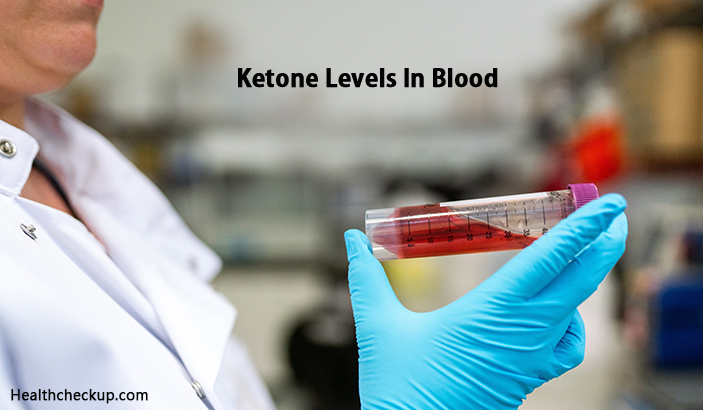What Are Ketones?
Ketones are chemical substances basically a type of acid produced as byproducts of the breakdown of stored fatty acids in the liver.
If the cells of your body do not get sufficient glucose for energy, the body responds by burning fat for energy. This process produces ketones that are found in the blood and urine.
The ketone levels in the blood are tested mostly to check for diabetic ketoacidosis (DKA) in people with diabetes. DKA is a serious condition causing diabetic coma or even death.
How To Test Ketone Levels?
Ketone levels can be tested in the blood or a urine sample. Testing can be done at home for both types of tests.
One should test ketone levels in blood or urine if;
- The blood sugar level is repeatedly higher than 240 mg/dl
- The blood sugar level crosses 300 mg/dl
- Unwell and has symptoms of DKA.
- Feeling sick or nauseated, regardless of the blood sugar levels.
1. Urine Test
Urine tests use a test strip that must be dipped into the urine sample. The strips comprise of specific chemicals that change colors upon reaction with ketones. The results on the strip are compared to the color chart provided. The condition of ketones being present in the urine is called ketonuria.
2. Blood Test
Uses an at-home meter and is performed like that of a finger-stick glucose test. A small drop of blood from the finger pricked with a needle is placed onto the testing area. The result will be displayed on the meter.
ketone levels in urine are not as accurate as of the blood ketone levels because it reflects the levels only up to a few hours before the test.
Research has reported fasting ketone levels to be more.
Symptoms Of High Ketones Levels
For patients with diabetes, it is imperative to be aware of the symptoms caused by having too high ketone levels in the body. These include;
Early symptoms
- A dry mouth
- Increased thirst
- Frequent urination
- High blood sugar (glucose) levels
- High ketone levels in the urine
Other symptoms if left untreated
- Confusion
- Extreme tiredness
- Flushed (red) skin
- A fruity breath odor
- Nausea
- Vomiting
- Abdominal (stomach) pain
- Difficulty breathing
Immediate medical attention is required if your ketone levels are very high.
Causes Of High Ketones Levels
Three major causes for a rise in ketone levels are;
1. Insufficient Insulin
When enough insulin is not injected, or the body requires more insulin than usual, possibly because of an illness
2. Inadequate Food
When unwell, inadequate consumption of food because of not being able to eat properly or do not feel like eating, ketone levels may rise. High ketone levels can also be seen with skipping a meal.
3. Insulin Reaction (low blood glucose)
This occurs when too much insulin is injected or eaten very less food or exercised without considering eating extra food. High ketone levels in the morning, maybe because of an insulin reaction while asleep.
The body’s major source of energy is glucose (sugar). When the body has low glucose or in patients with diabetes who do not have enough insulin to convert glucose into energy, the body uses fat as another source of energy instead. The liver breaks down fat into ketones and releases them into the bloodstream, which are used by muscles and other tissues. Normally, in people without diabetes, glucagon, insulin, and other hormones prevent high ketone levels in the blood. However, in patients with type 1 diabetes, high levels of ketones can build-up in the blood, making it more acidic and causes diabetic ketoacidosis (DKA). Rarely, patients with type 2 diabetes can also develop DKA.
- Type 1 diabetes – Patients produce very little or no insulin.
- Type 2 diabetes – Patients do not respond properly to insulin
Treatment For High Ketone Levels
Treatment for high ketone levels can help to avoid hospitalization for DKA. If unable to treat at home and ketone levels continue to rise, immediate medical attention is required. Treatment includes:
1. Intravenous (IV) Fluid Replacement
Increased urination is one of the DKA symptoms which can cause fluid loss. Rehydration with IV fluids helps to dilute the extra glucose present in the blood.
2. Electrolyte Replacement
The patients suffering from DKA tend to have low levels of electrolytes such as sodium, potassium, and chloride because of the absence of insulin. Losing too much of the electrolytes can affect the functioning of the heart and muscles. Electrolytes are given to the patients through a vein for normal functioning of the heart, muscles, and nerve cells.
3. Insulin
Insulin may be given through an IV in emergency situations, to improve the body’s ability to use and convert excess blood glucose into energy. Glucose levels are tested hourly during this therapy. When ketones and acid levels in the blood return to normal, IV insulin is not given any more, and the patients can resume their normal insulin therapy regimen.
If DKA is caused by an infection that causes vomiting, treatment is targeted at the underlying illness.
An Overview Of Low Ketone Levels
It is normal to have low ketones, as ketones will be produced only on burning body fat.
Ketones are low when you wake up, after an intense workout and highest before breaking your fast and drop immediately after eating snacks or food.
Some people on the ketogenic diet (low-carb, high-fat diet) are found to have low ketone levels. A few causes for low ketones could be:
1. Good Fat Burning Efficiency
According to one theory, some keto-adapted people have a high efficiency of producing and burning ketones, leaving no ketones in the urine.
2. Good Fat Burning Metabolic Machinery
Muscles burn free fatty acids directly and do not require extra fuel from ketones.
3. Genetic Susceptibility To Low Ketones
For a few people, even with a low-carb diet, several days of fasting may be required to detect a measurable number of ketones.
4. Increased Energy Demand Because Of Recent Exercise
ketones are consumed because of the energy demand during a workout
5. Caloric Efficiency
When eating fewer calories overall, fewer ketones would be produced.
Diabetic patients trying to lose weight will mostly have low-to-moderate levels of ketones. This does not increase the risk of developing diabetic ketoacidosis if blood glucose levels are controlled and maintained within normal ranges. The risk of DKA increases as the ketone levels increase along with an increase in blood glucose levels.
What Are Normal Ketone Levels?
- Normal ketone levels in the blood are less than 0.6 millimoles per liter (mmol/L)
- No ketones observed in urine is considered normal
Ketone blood test results
- Less than 0.6 mmol/L – normal
- 0.6 – 1.5 mmol/L – slightly high
- 1.5 – 3.0 mmol/L- moderately high
- Higher than 3.0 mmol/L – very high
Ketone urine test results
- No ketones
- Traces of ketones
- A moderate amount of ketones
- Large amounts of ketones
Tips To Maintain Normal Ketone Levels
Ketones have a significant role in providing a constant energy source. Studies have also shown that they reduce the level of inflammation and oxidative stress in the body, helping to reverse many effects of chronic conditions like diabetes and metabolic syndrome.
Several factors impact ketone levels in the body and vary from one person to the other. Some major factors to be considered to maintain normal ketone levels are;
- In case of high ketones, drink plenty of water to flush them out of your body
- Consider testing blood glucose levels every 3 to 4 hours
- Avoid exercising when the levels of both ketones and blood glucose are high
- Follow a low-carb diet for optimal ketone levels. Ketone levels are highly sensitive to the intake of carbohydrates and insulin inhibits the production of ketones.
- Consider balancing protein and fat intake for optimal fat burning. Protein intake inhibits ketone production as many proteins are converted to glucose.
In healthy people, ketones are used to provide energy to the muscles and tissues when glucose is absent or low in the diet. However, testing ketone levels in the blood is very important in patients having type 1 diabetes to prevent any complications resulting from high ketone levels.

Vasavi Attada specializes in creating content for Medical/healthcare domain. She has written articles for Indian Health Organization (IHO), American Diabetes Association, and for magazines such as India Today and Dignity Dialogue.
Vasavi Attada holds a Master’s degree in Microbiology from Bangalore University.









